'Ancient movement practice transformed my life'
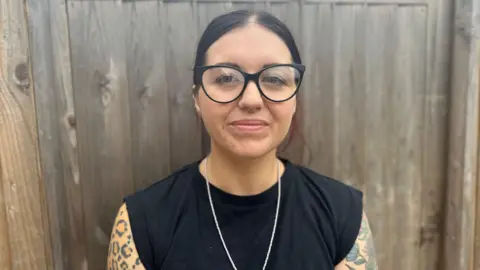 Anna Louise Claydon
Anna Louise ClaydonA woman who used to need a wheelchair said an ancient Chinese practice of movement and meditation had transformed her life.
Santana Corr, 36, from Framlingham, Suffolk, credits Qi Gong with helping her become strong enough to hike, go to the gym and now teach classes.
The mother-of-four has Ehlers-Danlos Syndrome, which affects connective tissues supporting the skin, bones and blood vessels.
Before starting Qi Gong, she was "in constant pain" and "stuck at home, in bed or in a wheelchair".
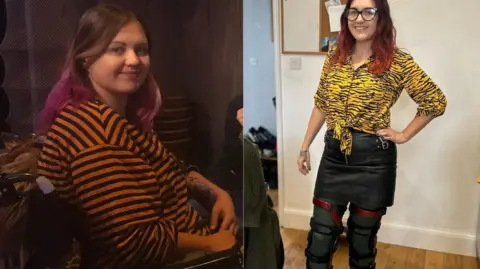 Santana Corr
Santana CorrTen years ago, just after her diagnosis, she depended on crutches before she had to use a wheelchair.
"I was stuck at home. I couldn't take my kids out, keep the house straight or have a normal life. My mental health was terrible," she said.
In an attempt to improve her strength, Ms Corr tried yoga but found that it was too strenuous.
She said her life began to change with the discovery of Qi Gong on YouTube. She could only manage five minutes a day initially but found the slow, gentle and flowing movements left her feeling energised.
"I could do it standing or sitting on a chair. In Qi Gong, you don't have to get up and down off of the floor so it's more accessible. There are no pressured positions, holds or balances."
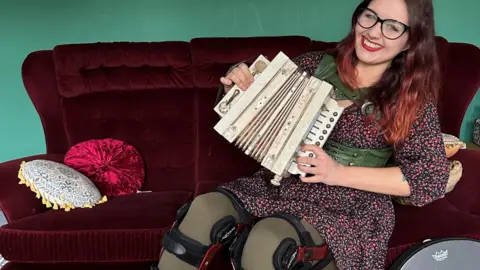 Santana Corr
Santana CorrWhat is Qi Gong?
- Qi Gong is a 5000-year-old ancient movement practice from China, made up of co-ordinated postures and movements, breathing and meditation.
- With roots in Chinese medicine, philosophy and martial arts, it has been claimed to utilise energy and improve health and wellbeing.
- Two million people practice worldwide and it is growing in popularity in the UK.
- Tai Chi was originally inspired by Qi Gong.
After five years of practising the ancient rituals, she found she could stand and walk unaided without her wheelchair.
"I then began to post progress videos on Instagram and people were really interested. They started asking for coaching advice. I thought, 'I need to get my teaching qualifications so I can share this journey with others.'"
She completed a masters degree at the University of Wales to become an instructor and now teaches 25 people a week.
"I wanted to create a safe space in Suffolk where everyone could explore Qi Gong and feel the benefits that I have," she said.
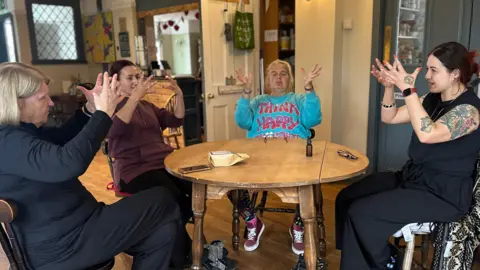 Anna Louise Claydon
Anna Louise ClaydonMs Corr was also recently diagnosed with ADHD, Dyslexia, Dyspraxia and Irlen Syndrome, which is a perceptual processing disorder that causes difficulty in making sense of visual information.
She said her health issues have made her determined to make her classes inclusive.
"I have been to two gyms in Suffolk that refused to put a chair out for me and I've had to cancel my subscriptions. I've been to other places where I would have loved quiet time or dimmed, relaxing light. I'm trying to create my own spaces that think about all of these aspects beforehand."
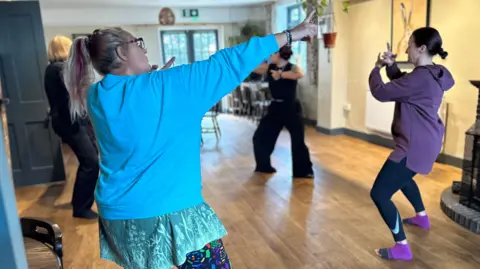 Anna Louise Claydon
Anna Louise ClaydonMs Corr says she noticed when running her classes that there was a need for conversation and community so she extended the sessions by half an hour, for no additional cost, "so that people can have a chat and a cup of tea".
"It's difficult to make friends. I moved to Framlingham from Felixstowe 10 years ago. I was really quite isolated living in our quiet, rural market town. It's a lovely place to live but I didn't know anyone.
"In that last thirty minutes, the group can talk about health, wellbeing and anything that has come up for them that week. They can share words of advice or I can bring out my oils for some facial massaging and breathwork."
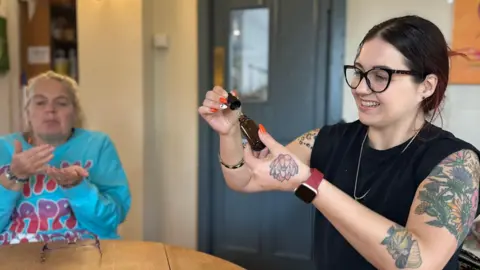 Anna Louise Claydon
Anna Louise Claydon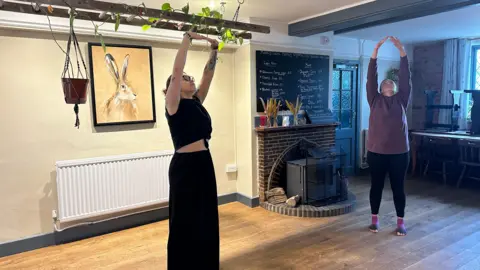 Anna Louise Claydon
Anna Louise ClaydonBecky Ellis, who tried the class for the first time, said it was "relaxing and energising at the same time".
"I'm looking to dial down my central nervous system and cortisol levels as I have a very busy, demanding life with a lot of responsibility so this felt just perfect," she said.
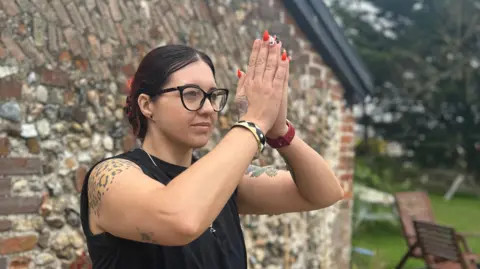 Anna Louise Claydon
Anna Louise ClaydonMs Corr now plans to hold some workshops for the charity Ehlers-Danlos Support UK, so she can help other patients.
"Before Qi Gong, I was in pain and distraught that my life had seemingly come to a close. Now I don't have to take half the medications I was on before, I can move my body again and life is busy," she said.
"First of all it was my dream just to get better, then it was my goal to help other people. I'm overjoyed to be making a positive impact locally. I had a vision of how I wanted my life to look and it's finally paying off."
